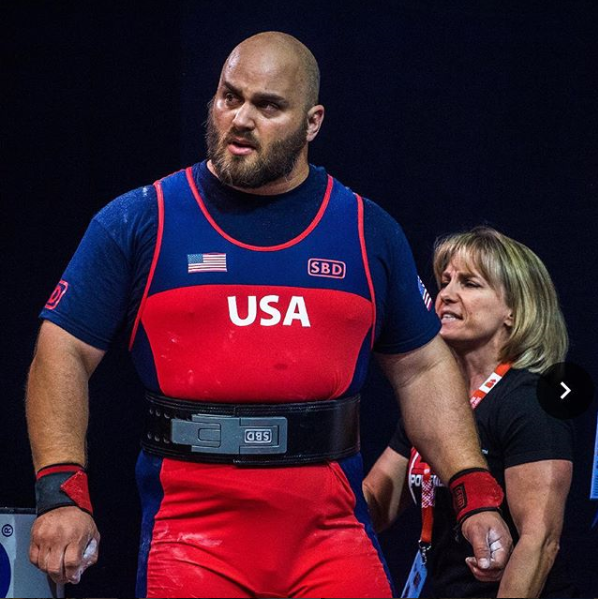International Powerlifting Federation champion Dennis Cornelius is one of the coolest dudes around. Whether he’s competing at the highest level international meets or doing a normal training session in his garage, he calmly approaches each lift with almost Zen calm. I called him up to find out how he manages to impose his will on the bar year after year since 2012 while training barefoot in Spartan like conditions from his home in Oklahoma.
Hey, Dennis, so, how long have you been training at home?
Pretty much … I mean, as long as I’ve been training. Pretty much … probably ten, fifteen years, however long I’ve been training.
And, you haven’t always been competing in powerlifting, you’ve done some Jiu Jitsu and you also played football when you were in high school. So, were you training at home throughout all of those times?
Well, for Jiu Jitsu, I would actually go to a club to do it in.
Well, I mean you trained for Jiu Jitsu at the Jiu Jitsu school. You, obviously for football, you’d have a team practice. But as far as lifting weights, you lifted weights at home?
Oh, yeah, I would probably do a lot of it at home. Even in high school, I would do a lot of it at home. I, except for off-season, where we would train during the day at school. But most of the time I’ve been training at home.
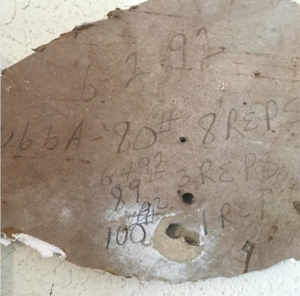
A lot of guys start out with weights in the basement with their dad, or something like that. Is that where you got your start?
Yeah, pretty much. Growing up, I lived out on some acreage in a small town in Oklahoma and we had weights in the barn, actually. We had a barn, we had our weights in there. So I started lifting there and eventually I moved off to college. So, when I was in college, I actually, for four years there I lifted in a gym, in a college gym, at Oklahoma State. And then, I moved back to the Tulsa area, where I got my house. I’ve had my garage set up in there since then.
Okay.
When I got out of college, I lived in an apartment complex for maybe a year. So, I was training at a gym, then. But when I got … when I finally go my house and everything, I moved everything to my garage.
And were you competing in powerlifting when you bought your house?
No, I bought my house in 2007. I didn’t start competing until 2012.
So that means your needs have changed. What did you first put in your garage gym?
Pretty much what you see. I’ve collected a little more over the years, but I built that squatter rack that you see a lot in my videos. I’ve had that since I was a kid. When I got older and went to school for some reason, somehow it ended up at my grandpa’s house. It sat out in the weather for a long time and as soon as I moved into my house, I went out and got it and put it back in my garage. I mean I’ve had that thing since I was a kid; I’ve been using it since then.
Wow. Let’s go ahead and give them a commercial, then. What brand is it?
It’s not a brand, it was home built.
Well, you’re an engineer, aren’t you? So you have a potential sideline, kind of like what Chris Duffin did. You can build racks whenever you finish your current career,
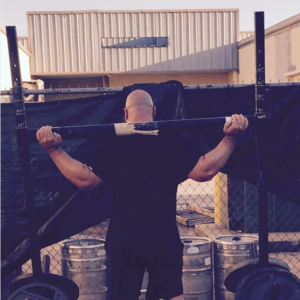
when you retire.
Oh, yeah … I’ve designed a couple of racks, but I just … you know, everybody and their dog makes them. It’s not really, you can’t … it’s hard to make money on something like that, I think.
Built by powerlifting champion, Dennis Cornelius, you know… everybody makes them, but not everybody can say that.
Yeah, that’s true. I guess I could start doing it,
Awesome, I’ll only charge you 10% of the sale price of each one for the idea. Ha! Okay, so let’s talk about your career. You obviously do compete in powerlifting now; very successfully, I might add. How many world titles have you won?
Well, I guess official, as far as when you talk about fed-specific, I’ve competed in the IPF and won two of their world championships in the 120 kilo class/264.lbs Won two world championships there. I’ve won three national championships in the USAPL. And then, now I’ve kind of made a goal to go after the all-time world total record at 275 for the open, tested and non-tested. My main focus now is that. It’s been always, kind of indirectly, but now it’s, now I’m really, really striving. I’m right there, within the grasp of it and I’m really striving for that now.
So conventional wisdom, would say that you need to get a powerlifting team around you if you want to be successful in powerlifting. But you are doing quite well lifting primarily alone in your garage at your house. You do have people come over from time to time, but you’ve been successful lifting by yourself. What made you decide, when you started powerlifting, not to go train anywhere else?
I think that’s what makes me more successful is the fact that I’ve trained alone so long. I mean, usually when I get around people and start training, it tends to distract me a little bit. I’ll do it, and it’s fine, but for the most part, I really prefer to train by myself. For whatever reason, I don’t know … it just seems to be a distraction when I have to workout with somebody. Because I tend to want to socialize when I get around people, and I don’t want to train as hard. But when I train at home alone, that’s what I’m focused on.
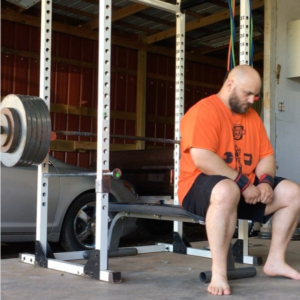 Let’s talk about the mindset, then. Because a lot of people who train at home alone, for example, get caught up in things like setting up their phone, so they can record the set. Or, they have kids running in and out. You’re a father and a husband, tell me about your mindset. How do you, number one, avoid distractions like setting up the phone?
Let’s talk about the mindset, then. Because a lot of people who train at home alone, for example, get caught up in things like setting up their phone, so they can record the set. Or, they have kids running in and out. You’re a father and a husband, tell me about your mindset. How do you, number one, avoid distractions like setting up the phone?
Well, like, setting up the phone is, it’s not really a distraction for me. It’s easy to do, I just set it up, and I have little stand I put it on. It takes no time. But the other distractions are pretty much gone when I’m training at home, so it’s pretty minimal. It allows me to avoid all the drama in the gym, because usually you go to these smaller gyms and you’ve got a lot of drama going on and you’ve got people wanting to talk to you, which is fine. I’m fine with that, but there’s some days that I just want to train by myself. If I go to the gym, it’s because I’m okay, I’m fine with talking to people and being distracted. But, like I say, at home, it’s just minimal.
So, your kids don’t come out to the gym to bother you, they just know this is daddy’s time to train?
Yeah, pretty much. I mean, sometimes they’ll come out there if it’s warm, or something. They’ll try to come outside, and sometimes I let them, and it’s fine. But when I’m lifting heavy, they know when that’s going to happen, and they know when to go back inside and leave me alone.
What things do you focus on? USAPL competitor Mike Parrot said when he trains at home, he trains as if there’s a crowd. And then when he’s at a competition, he’s at a meet, he competes as if he’s home alone. Because that way, you avoid both getting distracted by the crowd, and when you’re at home, you avoid getting so locked into the fact that you’re alone that you can’t handle the crowd when you go to a meet. Especially at your level. How do you handle it?
I don’t know how to word this, but when I lift at home alone, I’m usually envisioning beating numbers, beating myself, or beating somebody on a platform. And that’s all I’m focused on. I don’t really focus on the crowd. When you go to a powerlifting meet, the crowd’s there to watch you; you just expect that. So I tend to tune them out. You’re there to fail, or not. It’s expected. It’s a powerlifting meet, there’s a lot of things that could cause you to fail and I’m not worried about it.
In a gym everybody wants to see you get a lift, or if you fail, people look at you differently. I don’t know if that makes any sense. The people aren’t there to see you. That’s one of the reasons why I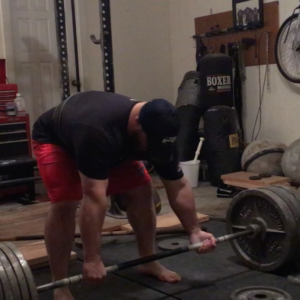 don’t like to train at a gym as much, because they’re not there to see you; at a meet, the crowd is there to see you lift. So it’s expected that they’re going to watch you, and you’re there to perform that specific task; whereas at a gym, you’re just a spectacle.
don’t like to train at a gym as much, because they’re not there to see you; at a meet, the crowd is there to see you lift. So it’s expected that they’re going to watch you, and you’re there to perform that specific task; whereas at a gym, you’re just a spectacle.
We talked about this a little bit when you and I have talked on the phone before. You have a martial arts background, and one of the things especially with a martial art like Jiu Jitsu, is you have to focus on your technique. And you go to a Jiu Jitsu tournament, there’s a crowd there, but you have to be kind of dialed into your technique and focus on that. Do you think that’s one of the reasons why you’re so good at training alone but competing in front of a crowd?
Yeah, I think that’s probably a little closer to the reason. But I tend to focus more on an opponent than I do on technique. I mean, especially on these big lifts, I usually have an opponent in mind. I’m there to beat somebody or something. Whether it’s somebody at a meet, or if against myself, or somebody else at another meet, or not even competing that day, I’m focused on an opponent and on a number.
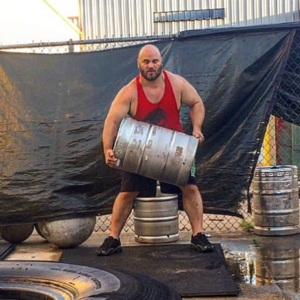 Okay.Then, let’s talk about some of the pieces of equipment that you choose. Because you’re not like a lot of people. I think that sometimes the less skill you have, the more equipment you buy; the more gadgets you have. But the other side of it is, at a certain level, you have to have certain things, so that you can mimic competition conditions. So, what, specifically, do you have in your gym that you have because you compete at such a high level in powerlifting?
Okay.Then, let’s talk about some of the pieces of equipment that you choose. Because you’re not like a lot of people. I think that sometimes the less skill you have, the more equipment you buy; the more gadgets you have. But the other side of it is, at a certain level, you have to have certain things, so that you can mimic competition conditions. So, what, specifically, do you have in your gym that you have because you compete at such a high level in powerlifting?
Well, probably part of my problem is that I don’t have enough. I mean I have specialty bars and I took them all to a gym here in town. I lift on that same squat rack that you see in videos and I use crappy bars because in my mind it’s going to be that much easier when I get to a meet and I do have the good bars and the calibrated plates. I don’t know if that makes sense.
Does it boost your confidence if you’ve had a bad session in the garage; you power through it maybe but the weight didn’t move like you think it should. Does it give you confidence to know that if you can get it done in those less than ideal conditions that you can definitely perform on Game Day?

